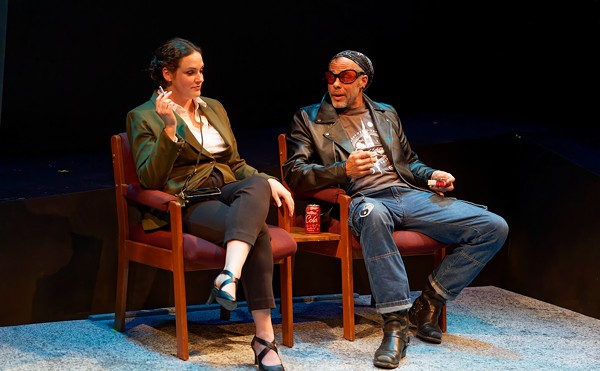At the high school science fair that serves as the core of Paul Zindel's play The Effect of Gamma Rays on Man-in-the-Moon Marigolds, currently on exhibit at Stray Dog Theatre, science experiments are divided into three categories: past, present and future. For the embittered Beatrice (Andra Harkins), a bedraggled single mother with two adolescent daughters, life breaks down the same way. Her present is a nightmare; the future is even bleaker. At least the past contains nostalgic memories into which Beatrice can retreat when life weighs her down, which is most of the time. And because her girlish dreams have been shattered, Bea begrudges her daughters their own ambitions and yearnings. But Tillie (Allison Ginsburg) is more than a dreamer. She is a young scientist. When her experiments with seeds that have been subjected to radiation result in recognition at the science fair, the misanthropic Beatrice must choose between sharing in her daughter's happiness or wallowing in self-indulgence.
Zindel's play is resonant with metaphor. Tillie and her problematic younger sister Ruth (Jessica Cohen) are like the marigold seeds. How many poisonous rays can they survive? How long can you tolerate a loveless home before you finally suffocate? Then there's the pet rabbit that lives in a cage, and that's fairly symbolic too.
Before he became a writer, Zindel was a high school science teacher. He has used his past to effect: Marigolds benefits from a certain jargon that sounds accurate. But the play itself has had a remarkably checkered history. It failed on Broadway, thrived off Broadway, failed on television, moderately succeeded as a feature film (with a new writer). Clearly it has its admirers, though it is bewildering to understand why critics insist on comparing Zindel's script to Tennessee Williams' Glass Menagerie. True, both plays concern single mothers living in poverty with two children. But the despairing Beatrice has nothing in common with the valiant Amanda Wingfield, who inhabits Williams' play. Amanda would do anything for her children; Beatrice does nothing for hers. Amanda's reason for living is to safeguard her children's future; Beatrice lives for herself. And although Zindel tosses in the occasional evocative noun, especially in Tillie's monologues, there is no sustained eloquence here, as there is throughout Williams' Menagerie. What we're left with, at Stray Dog anyway, in a production directed by Gary F. Bell, is an evening of unrelieved grimness.





